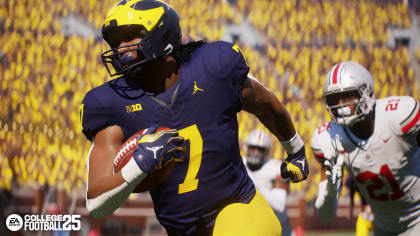Peak excitement at EA Sports with college football rejoining Madden in gaming universe
ORLANDO, Fla. — On a muggy May morning, representatives from video game company Electronic Arts opened their doors to a group of reporters and content creators to take a peek at the future of virtual American football.
That appears to be how EA Sports sees itself now. No longer as just the publisher of Madden NFL (among many other sports titles), but as the home of American football played on the gaming gridiron.
There’s been a notable shift in EA Sports’ outlook — it was palpable at the office that day. The downtown Orlando building was buzzing with positive energy, and for good reason: Unlike a year earlier, when EA invited a select group of media members and content creators out to their Redwood City, California, studio for a preview of Madden NFL 24, the company had two titles to reveal this time.
And it seemed they couldn’t be more excited about the two games.
For the first time since 2013, EA Sports will release two American football games in one summer. First up: The highly anticipated mid-July return of a college football series that went dormant in 2014 amid a lawsuit brought by former UCLA basketball player Ed O’Bannon regarding name, image and likeness (NIL) rights.
With NCAA Football 14 standing as the company’s last college football game, anyone wanting to play an updated version was forced to turn to a group of hobbyists who released modifications (known as College Football Revamped) of the game for free, underscoring the fervor that followed the sport even after its video game entered hibernation. When subsequent suits cleared the way for college athletes to be compensated for the use of their NIL, a new era opened, creating an avenue for EA to get back into the game.
EA dropped NCAA from its title before re-entering the market with one of the most anticipated video games in recent memory: College Football 25, a game packed with authenticity and a passion for the sport. For the first time, it will include the names, images and likenesses of the players who bring the sport to life every Saturday, including a trio of current college stars — Texas quarterback Quinn Ewers, Colorado cornerback/receiver Travis Hunter and Michigan running back Donovan Edwards — on the game’s cover.
The process required painstaking attention to detail, including building 134 stadiums in the game — one for each FBS program — while trying to replicate as much of their individual traditions and uniqueness as possible. It also called for a development cycle that tripled Madden in terms of years.
After spending a few hours playing the game, I can confirm the finished product is excellent, recreating the wide-open play pervasive at the collegiate level while returning nearly every key feature that made the past NCAA games the stuff of legend. But that’s not all EA Sports has going for itself. The developers of Madden feel as if they’re in a great position, too, riding momentum gained from a successful Madden 24 toward even greater heights.
Optimism truly reigns at EA Sports in 2024. Those in charge of delivering on this excitement couldn’t hide their joy in May, decking out the office in game-specific signage and rolling out an army of staff — including guest appearances made by Hunter, former NFL quarterback Michael Vick, viral streamer Sketch and ESPN play-by-play commentator Chris Fowler — for the two-day event.
But for those who haven’t had a chance to play the game yet, questions remain. Is Madden ready to take some long-awaited steps to improve the game? Will College Football simply be another version of Madden, but with different players? And ultimately, should everyone buy into the hype?
When the creators of College Football 25 learned they would finally be making the game, they quickly came to one crucial realization.
“We had a core pillar and saying that we’ve always said: You get one chance to make a second first impression,” production director Christian McLeod told me. “This is a gift that we’ve been given. And we needed to make sure, as the college football sickos that we are, that this thing was perfect.”
After a development cycle that included an unofficial one-year delay from 2023, players will soon be able to get their hands on a new college game for the first time since President Barack Obama’s second term in office. The launch is so significant, it has broken the barriers of gaming. Comedian Shane Gillis has even proposed renting a house with friends solely to participate in a dynasty league together.
Given how eager many fans seem to be to play a college football video game, EA presumably could have gotten away with simply presenting College Football 25 as a reskinned version of Madden without worrying about capturing the core tenets of the college game.
“None of us would be here if that was the case,” principal game designer Ben Haumiller told me. “If they said ‘We’re coming back with college football, and it’s just going to be this barebones thing and we’re done.’ Have fun, guys. I’m not the guy for that. But if you want to get back and make a serious college football game, (I’m) right here.”
College Football 25 truly plays differently than Madden NFL 25. They’re two different games. There are some essential similarities that became clear during EA’s preview event, which effectively staged the two-day session with a clear intent to prove this point.
Day 1 was all about Madden NFL 25. This year’s edition includes features building on last year’s installment, which sparked record-setting totals in daily active users, peak simultaneous users and live service engagement lasting well beyond the actual NFL calendar, according to EA. The results invigorated the development team ahead of the launch of the new game.
Boom Tech is a new physics-based tackling system that builds upon the “Hit Everything” system rolled out in Madden 24, replacing canned animations of contact with more naturalistic depictions of this element of the sport. A reloaded Hit Stick — a legendary feature first introduced in Madden NFL 2005 — refreshes the defensive staple of Madden.
On offense, ball-carrier moves have been completely revamped. Precision jukes have been tossed aside in favor of a new system that attempts to replicate the agile cutting abilities of the game’s cover athlete, Christian McCaffrey, and so many other NFL stars.
In the trenches, users can set up their pass protection by each side of the line, and blockers work more independently than ever, allowing for the true logic of blocking schemes — including instances in which a unit isn’t prepared for a blitz — to shine through. The same is true for pre-snap route adjustments, all with the same goal in mind: Give the players more control than ever.
As for franchise mode — long the target of some fans’ ire — the development team has stepped things up significantly, giving the entire mode’s user interface a makeover while adding significant depth in storytelling and customization. Over 70 new storylines have been written for Madden 25, including some that will trigger only after drafting a rookie quarterback (and deciding whether to let him ride the bench for his first season) and others that stretch beyond the previously established limits of a player’s imagination (hint: Dan Campbell might chew your player out for showing up out of shape). And plenty of them are much more than one-off narratives; some can even last for multiple seasons.

Day 2 of EA’s preview presentation provided a chance to compare and contrast the gameplay and features of the company’s stalwart NFL title against its newest star: College Football 25.
First, the real differences: Boom Tech is not in College Football 25. The new kicking and passing meters in College Football 25 are not in Madden 25. And, just like in real life, the college game does not play the same way that the pro game does.
“It really boiled down to what our core pillars were as a game,” McLeod said. “The first and foremost piece was around gameplay. We needed to make sure we had authentic, true college football gameplay through our CampusIQ. And that’s more wide open. There are larger ratings differentials. These are college kids, these are 18-year-olds at, say, a smaller-tier school going up against a 19-, 20-year-old at a large-tier, blue-chip school. There is a large differential there versus the NFL. They are the best of the best, that’s why they’re in the NFL. There’s more parity there. There is not as much parity in college football. So we wanted to replicate that first and foremost.
“But I think, too, one of the main differentiation points is the pageantry. Those sights, sounds, traditions of what college football is all about.”
The Oregon Duck rides a motorcycle out of the tunnel at Autzen Stadium in College Football 25. The eagle flies at Auburn. Fireworks are even launched from the correct location (Murphy Mellis Field, a field hockey facility) behind Kent State’s Dix Stadium.
Developers earned one of their strongest reactions at the May presentation by showing a real-life clip of rapper Sheck Wes’ “Mo Bamba” playing during a 2019 Michigan-Penn State game, then dissolved into the same scenario recreated in the video game — with “Mo Bamba” playing in the virtual Beaver Stadium.
Yes, it was chills-inducing — precisely the reaction the college football-obsessed developers are aiming for in College Football 25.
“It’s awesome because our art director is from England,” McLeod said. “Working on this game has made him a bigger college football fan, but it’s also made him realize how close college football, rabid fandom and pageantry is to Premier League soccer.
“When you look at it through that lens, the NFL, certain stadiums have their own unique pieces but it’s not that passion, that pageantry. The stadiums aren’t as big, you’re not at a Neyland (Stadium), a Big House (Michigan Stadium) and sort of feeling that rattling and pageantry across the board. … Some of the logic pieces that we had built in the Madden game do help each other out, but the way we present it is 180 degrees different.”
Those flourishes also speak to the similarities between College Football 25 and Madden 25. The language the developers of College Football 25 used to describe their focus on authenticity and game-day atmosphere echoed comments that Madden developers made about their game a year ago, but with one key difference revolving around their internal motto: Every school is somebody’s favorite school.
And then there’s the long-desired return of a legendary feature to Madden NFL 25: TeamBuilder.
Yes, the same web-based program that will allow players to create custom schools in College Football 25 is returning to Madden, clearing the hurdles of required NFL approval to truly give players a level of customization that once only existed in their dreams — or for some, their teenage years.
TeamBuilder’s inclusion across both College Football 25 and Madden 25 stands as a shining example of the power of collaboration, and the willingness to listen to the gaming community. As Madden NFL 25 creative director Connor Dougan noted, developers “get super hyped when we see cool PC mods of Madden,” and “can’t wait to see what the millions of people create and download.”
“TeamBuilder itself has been something that has been on the list of things that people want in Madden,” Madden NFL 25 senior producer Michael Mahar told me. “And by the way, it used to be in Madden. It had been there previously, before our time. But it’s something people wanted. It was also a priority for College (Football 25). This was one of the great advantages of working on American football, the ecosystem together. We can collaborate with other really talented people to bring something that should’ve never gone away back to the players, and then grow it.”
This is a gift that we’ve been given. And we needed to make sure, as the college football sickos that we are, that this thing was perfect. — College Football 25 production director Christian McLeod
In the past, both games came from the same studio, EA Orlando, which was known until 2023 as EA Tiburon. In those days, most new features included in Madden would find their way to the college game in the following year.
Because of the focus on individuality between games, that might not be the exact case this time around. Still, though, the possibility of collaboration — plus, a little bit of in-house rivalry — should bode well for both gaming franchises going forward.
“Yeah, they always say ‘A rising tide lifts all boats,’ ” Haumiller said. “That’s very much the same thing here. Now we have two teams making football games instead of just one. We have double the mind share of ‘Hey, what are you guys doing over there? Oh, that’s cool, let’s do that!’ Features that we can work on together that there’s a core that we can both do that’s the same, then we branch off. We make the college version, they make the NFL version that make them unique to themselves, but there’s a fundamental core that can be shared between the two.
“And also, too, we can’t do things the way they’ve always been done just because of the size and scale that we have, so like Christian (McLeod) was saying, that helps push Madden to rethink the way they’re doing things, and makes us all better. Iron sharpens iron, right? We’re trying to make the best product, they’re trying to make the best product. It’s a sibling rivalry a bit because obviously we want to make the best game, (and) they want to make the best game. The fans are getting the best games because of that, so I think that’s where we all come together to try to make the best games we can.”
Madden is able to start swimming now, as Mahar said EA has empowered the development team to look more toward multi-year initiatives, from which Boom Tech came. And if College Football 25 ends up being the hit EA hopes it will be, fans can expect even better results in the coming years. With two talented development teams working in the same building — sometimes separately, sometimes in tandem — the future appears brighter than ever.
“We look at it as an American football business, and it is super important for us to work together because we can help each other,” McLeod said. “We can help each other in terms of tech, we can help each other in terms of gameplay, of course, graphics. It’s one of those situations where we had to look at things very differently on College Football compared to Madden. We had to build 134 stadiums. We have thousands of players that we have to make faces for. So all of that tech that we’ve been able to create is going to benefit Madden and strengthen our football business across the core.
“I think that’s where we’re excited to be doing a lot of what we’re doing, because it’s going to strengthen the studio and football as a whole.”




